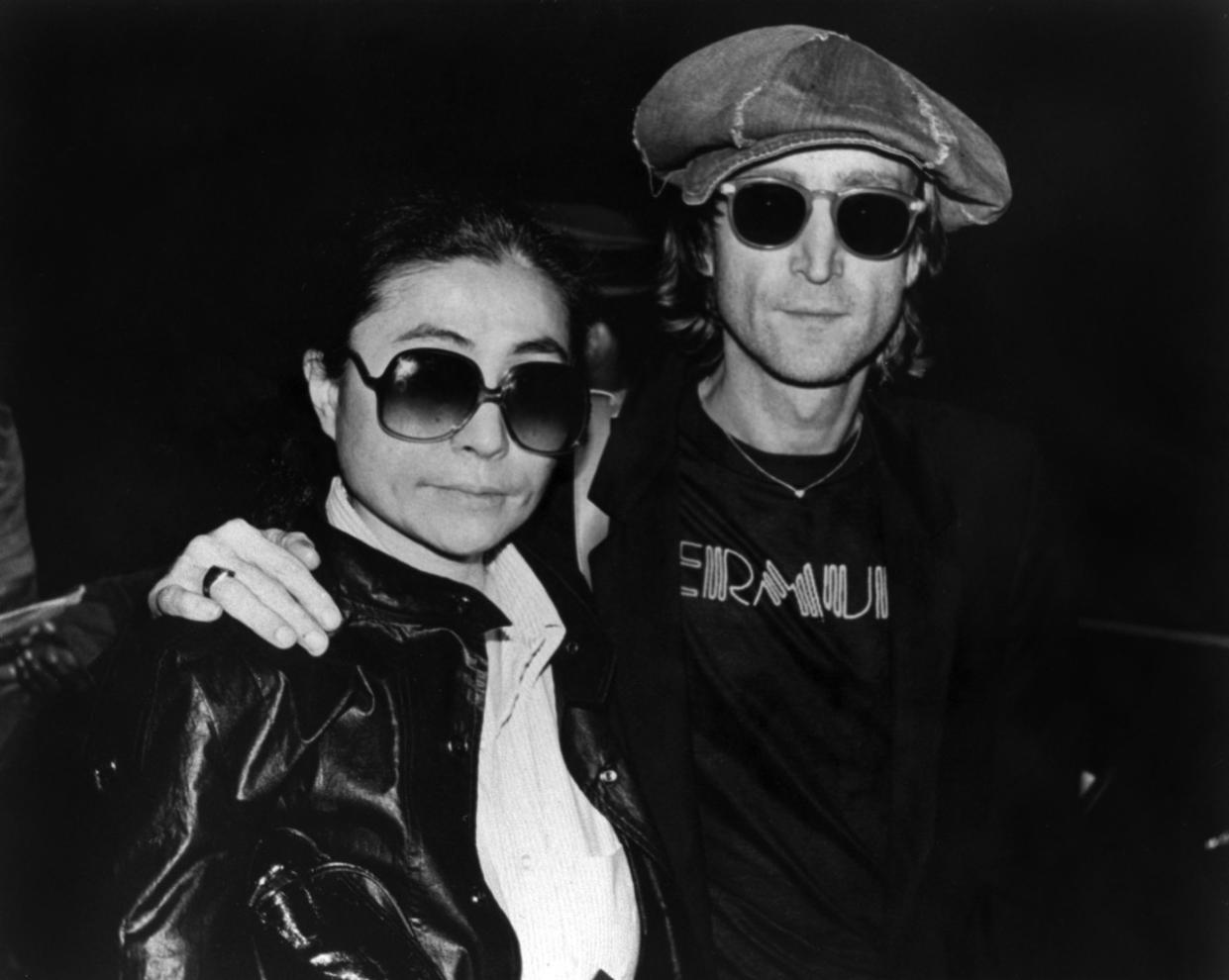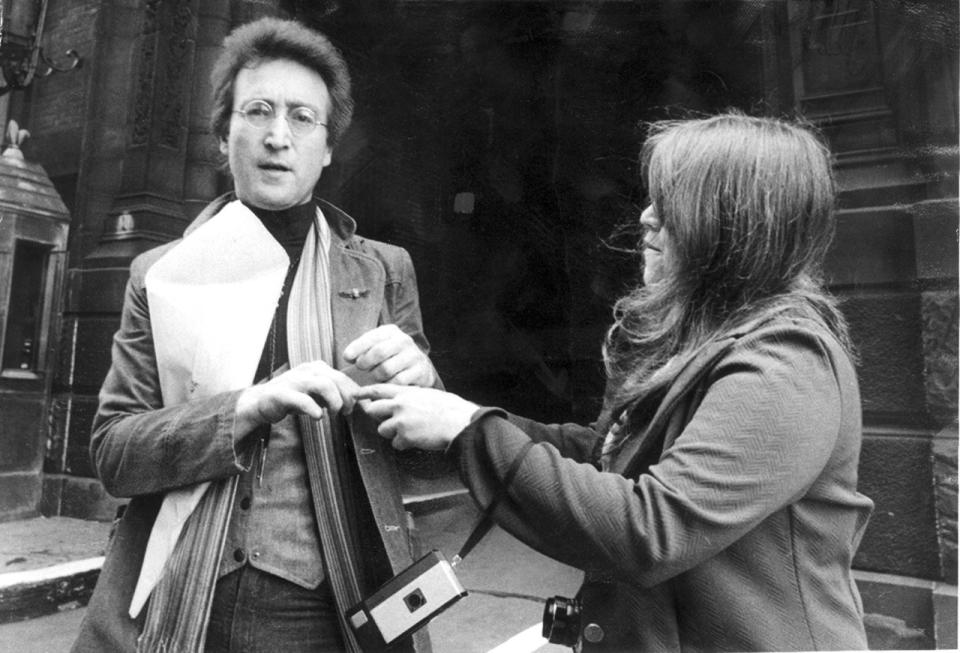How Musicians Reacted to John Lennon’s Shooting Death: With Love, Not Fear

John Lennon with Yoko Ono outside the Dakota apartment building in 1980 (photo: Vinnie Zuffante/John Lennon Archive)
In the wake of the mass murder at an Eagles of Death Metal concert in Paris last month, U2’s Bono said that “this is the first direct hit on music that we’ve had in this so-called War on Terror or whatever it’s called.” But many fans have a different idea of what constituted rock’s first terrorist attack. They’d date it back to Dec. 8, 1980, even if the gunman who killed John Lennon 35 years ago, Mark David Chapman, was a lone lunatic with no greater goal than furthering the cause of Holden Caulfield.
Related: 35 Years Later, John Lennon’s Politics Are as Loud as His Music
Just as with the French attacks, the days after Lennon’s assassination were marked by public and private fears that nothing less than a fortress-like mentality would keep musicians – or fans – safe. “Lennon’s security wasn’t just minimal, it was nil,” security expert Gavin De Becker lamented in a March 1981 People magazine article, which detailed an all-star meeting on defense measures held in the Hollywood hills at Joan Rivers’s house in the wake of the shooting. “His assassination set off shockwaves of fear in our community,” Rivers’s husband, Edgar Rosenberg, said at the time. "What has the film community concerned is that Lennon was killed by the sort of fan who has been around in the past but has never been violent before.”
Yet, in the subsequent three and a half decades, the legacy of Lennon’s death has been one of love more than fear. Although you could cite aberrations, like the onstage killing of Pantera co-founder Dimebag Darrell in 2004, the worst fears that existed in the cloud of dread at the end of 1980 have rarely come to pass. The stars got smarter about security, but few walled themselves up from the outside world. Although no one would have articulated it this way at the time, the feeling was: If you can never greet fans anymore, truly, the terrorist has won.

Lennon with a fan outside the Dakota (photo: New York Daily News Archive)
Imagine no security precautions? That’s not easy, even if you try. But the most sensible rockers have balanced those needs with moments of openness to the world. Take Paul McCartney, who had more reason than anyone to take the likes of Chapman personally. He’s hardly bodyguard-avoidant, when he’s on a predictable schedule: When he visited Bogota, Columbia for two days, the ex-Beatle was described as being surrounded by a 1,400-strong “ring of steel.” Playing a gig in Israel. McCartney had even more security, to the tune of 5,000 men, reportedly.
Yet stories abound of McCartney leaving his London office on foot for a stroll, without any surrounding muscle to speak of. And when he and future wife Nancy Shevell did a driving tour of Route 66 in 2008, it was without a parade of tanks, posing for photos with the incredulous onlookers who recognized him at diners along the way. As much as anything else McCartney did to honor Lennon’s life and death, he did his onetime partner proud by refusing to see life entirely from behind tinted windows or have a bodyguard phalanx blocking every fan’s approach.
As James Andrea of RAD, a major music celebrity protection company, said recently in Variety, “Most of the time it is just a fan that wants to hug their superstar.” As the tens of thousands of bearers of Taylor Swift autographs or selfies can attest: Chapman didn’t win.
It takes courage sometimes to be a performing musician. At one of the Grateful Dead’s last gigs with Jerry Garcia in 1995, they played the entire show with the house lights up, because of a death threat. The Dixie Chicks played on in 2003 despite receiving the threats they actually memorialized in the lyrics of “Not Ready to Make Nice.” U2 might’ve been forgiven for a case of nerves when they finally played their make-good Paris concert this week, and whatever band accepts the honor of officially reopening the Bataclan could have a little trepidation. But in the end, now as in 1980, music will not become a police state. Because have there ever been poorer bedfellows than rock ‘n’ roll and fear?
Another way rockers honored Lennon’s death, besides refusing to retreat into castles, was to grapple with it in song. The music that was written about and in the wake of Lennon’s killing included not just maudlin tributes but some surprisingly thoughtful, bittersweet attempts to look for meaning in the madness.
Most recently, Bob Dylan ended his Tempest album with “Roll on John,” a rewritten traditional updated to include lyrics about Liverpool, Hamburg, the Quarrymen – and how “they shot him in the back and down he went.” That’s the most recent ode of note by a fellow superstar in a line of succession that goes back to McCartney’s own “Here Today” in 1982.
“The truth of the matter is,” McCartney has said, “when John died… there was the obvious sort of thing: Is anyone going to write a song about John? Because obviously certainly we all felt deeply enough, and normally when we felt deeply enough, we committed it to song.”
Doing these songs live is another matter, for those who knew Lennon. Elton John, in the liner notes to a boxed set, said of “Empty Garden,” his tribute to his friend: “When John died, it really did affect me a lot. I still can’t believe sometimes that he’s not actually there. I was living in Paris at the time, and not going through a particularly good period in my life. I was very depressed, and I wrote an instrumental called 'The Man Who Never Died’… And Taupin wrote 'Empty Garden.’ I was so impressed with mine, but when Bernie came up with the lyrics for 'Empty Garden,’ I didn’t think anyone would be able to say anything without being clumsy or cheesy… I performed it once on a tour, and I won’t again. I find it very hard to sing. It upsets me to sing that song.”
Despite that reluctance, Elton revisited the subject in 2006 in “Blues Never Fade Away,” singing, “The pain never goes away… I miss John Lennon’s laugh.”
Paul Simon devoted the final verse of “The Late Great Johnny Ace” not to the title figure but to Lennon: “On a cold December evening, I was walking through the Christmas tide/When a stranger came up and asked me if I’d heard John Lennon had died/And the two of us went to this bar, and we stayed to close the place/And every song we played was for the Late Great Johnny Ace.”
Next-generation stars like the Bangles’ Susanna Hoffs have also written about that shattering Monday night. In her song “Weak With Love,” Hoffs wrote: “December 8 in 1980, I was home on Avondale/Boys were playing basketball when the news came in/I heard my brother say, ‘Oh, my God’/I said, ‘What’s the matter, Jesse?’/He said, ‘I don’t wanna tell you this’/And he would not meet my eyes…”
The list of homages goes on, from Queen’s “Life Is Real (Song for Lennon)” to Stevie Nicks’s “Edge of Seventeen,” which she has explained is at least partly about hearing about Lennon’s death that Dec. 8. Joan Baez’s “Sgt. Pepper’s Band” was mostly about Lennon, of course, but stooped to allude to his assailant: “I live in the age of cosmic maniacs/One of them put a bullet in your side/New York City, 1980/The day the ‘60s finally died.”
Others took on the subject of Chapman more blatantly, and even more angrily. Belying his gentle image, Rick Springfield all but vowed vengeance on Chapman in “Three Warning Shots,” mockingly singing, “Standing on a New York sidewalk with a loaded gun/Mommy’s depressed little boy/Holden Caulfield’s stable-boy… I’ll give you three warning shots to the head.”
A handful of other songs ironically took the killer’s point of view, like the Cranberries’ “I Just Shot John Lennon” and Wall of Voodoo’s “Seven Days in Sammystown.” Less ironically, the metal band Eighteen Vision asked “Who the F— Killed John Lennon,” while folk-rocker Ellis Paul’s “Who Killed John Lennon” spoke for many with its opening line: “Do not mention his name.”
But it may be Christine Lavin’s lesser-heard “The Dakota” that most poignantly establishes the choices that face every celebrity, about just how open to be, as an alternately public and private figure: “It was December in the afternoon…/Signing records as you’re passing through/You saw everyone as an angel/But what about the thieves?…/If you just kept walking on your way…”
For a Lennon fan, there can be no end to that kind of “what if.” But most would probably believe that in death, as in life, Lennon would be on the side on the angels… and, given the choice between treating the Dakota as a fort or a passageway to real life, he’d still sign that album.

